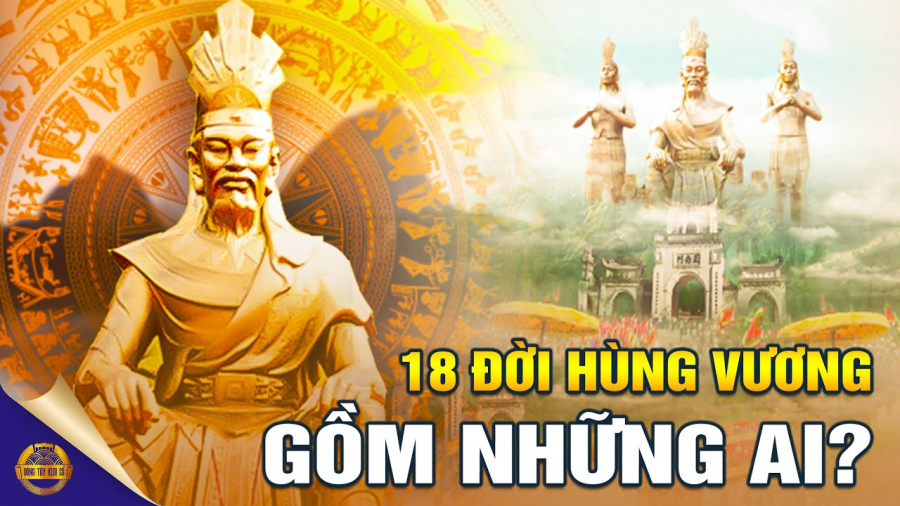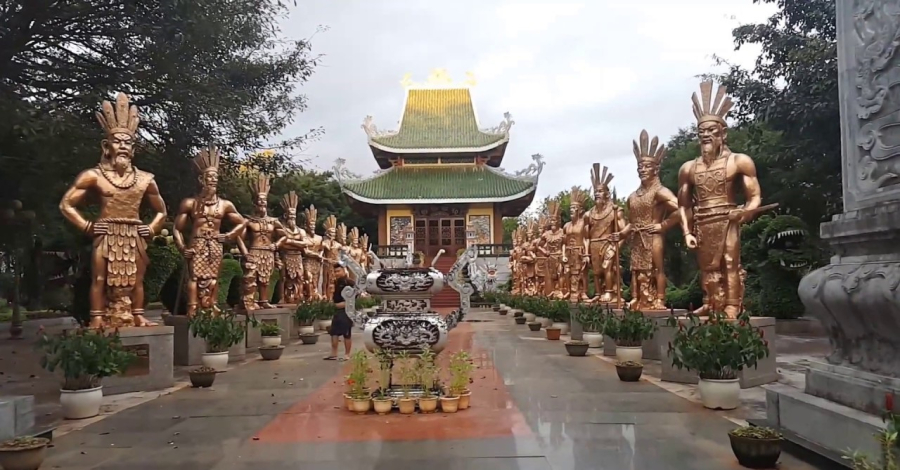Hùng Vương is the name given to the kings of Văn Lang, the ancient kingdom of the Lạc Việt people, believed to have been established over 4,000 years ago. The story of the Hùng kings is not found in official history but is part of the folklore of the Vietnamese people, passed down through generations. To the Vietnamese people, the Hùng kings represent ancestors, the founding tradition, and the pride of a unique civilization that has thrived for thousands of years.

Which kings are included in the 18 Hùng kings?
According to Đại Việt sử lược (Comprehensive History of Great Việt) and other historical documents, the Hùng dynasty consists of 18 kings, including the following:
- Kinh Dương Vương, also known as Lộc Tục or Lục Dục Vương. He was born in the year Nhâm Ngọ (2919 BC) and ascended the throne at the age of 41, reigning for 86 years, from the year Nhâm Tuất (2879 BC) to Đinh Hợi (2794 BC).
- Lạc Long Quân, also known as Sùng Lãm or Hùng Hiền Vương. He was born in the year Bính Thìn (2825 BC) and ascended the throne at the age of 33, reigning for 269 years, from the year Mậu Tý (2793 BC) to Bính Thìn (2525 BC).
- Hùng Quốc Vương, also known as Hùng Lân. He was born in the year Canh Ngọ (2570 BC) and ascended the throne at the age of 18, reigning for 272 years, from the year Đinh Tỵ (2524 BC) to 2253 BC.
- Hùng Hoa Vương, also known as Bửu Lang. He ascended the throne in Đinh Hợi (2252 BC) and reigned for 342 years, from Đinh Hợi (2254 BC) to Mậu Thìn (1913 BC).
- Hùng Hy Vương, also known as Bảo Lang. He was born in the year Tân Mùi (2030 BC) and ascended the throne at the age of 59, reigning for 200 years, from the year Kỷ Tỵ (1912 BC) to Mậu Tý (1713 BC).
- Hùng Hồn Vương, also known as Long Tiên Lang. He was born in the year Tân Dậu (1740 BC) and ascended the throne at the age of 29, reigning for 81 years, from the year Kỷ Sửu (1712 BC) to Kỷ Dậu (1632 BC).
- Hùng Chiêu Vương, also known as Quốc Lang. He was born in the year Quý Tỵ (1768 BC) and ascended the throne at the age of 18, reigning for 200 years, from the year Canh Tuất (1631 BC) to Kỷ Tỵ (1432 BC).
- Hùng Vỹ Vương, also known as Vân Lang. He was born in the year Nhâm Thìn (1469 BC) and ascended the throne at the age of 39, reigning for 100 years, from the year Canh Ngọ (1431 BC) to Kỷ Dậu (1332 BC).
- Hùng Định Vương, also known as Chân Nhân Lang. He was born in the year Bính Dần (1375 BC) and ascended the throne at the age of 45, reigning for 80 years, from 1331 BC to 1252 BC.
- Hùng Uy Vương, also known as Hoàng Long Lang. He ruled for 90 years, from 1251 BC to 1162 BC.
- Hùng Trinh Vương, also known as Hưng Đức Lang. He was born in the year Canh Tuất (1211 BC) and ascended the throne at the age of 51, reigning for 107 years, from the year Canh Tý (1161 BC) to Bính Tuất (1055 BC).
- Hùng Vũ Vương, also known as Đức Hiền Lang. He was born in the year Bính Thân (1105 BC) and ascended the throne at the age of 52, reigning for 86 years, from the year Đinh Hợi (1054 BC) to Nhâm Tuất (969 BC).
- Hùng Việt Vương, also known as Tuấn Lang. He was born in the year Kỷ Hợi (982 BC) and ascended the throne at the age of 23, reigning for 115 years, from the year Quý Hợi (968 BC) to Đinh Mùi (854 BC).
- Hùng Anh Vương, also known as Viên Lang. He was born in the year Đinh Mão (894 BC) and ascended the throne at the age of 42, reigning for 99 years, from 853 BC to 755 BC.
- Hùng Triệu Vương, also known as Cảnh Chiêu Lang. He was born in the year Quý Sửu (748 BC) and ascended the throne at the age of 35, reigning for 94 years, from the year Đinh Hợi (754 BC) to Canh Thân (661 BC).
- Hùng Tạo Vương, also known as Đức Quân Lang. He was born in the year Kỷ Tỵ (712 BC) and reigned for 92 years, from the year Tân Dậu (660 BC) to Nhâm Thìn (569 BC).
- Hùng Nghị Vương, also known as Bảo Quang Lang. He was born in the year Ất Dậu (576 BC) and ascended the throne at the age of 9, reigning for 160 years, from the year Quý Tỵ (568 BC) to Nhâm Thân (409 BC).
- Hùng Duệ Vương, born in the year Canh Thân (421 BC), ascended the throne at the age of 14, reigning for 150 years, from the year Quý Dậu (408 BC) to Quý Mão (258 BC).
Some insights about the Ancestral Anniversary of Hùng Vương
The Ancestral Anniversary of Hùng Vương, also known as the Hùng Temple Festival, is a national holiday to commemorate and express gratitude to the Hùng kings for their contributions to the nation.

Traditionally, every year on the 10th of the third month in the lunar calendar, millions of Vietnamese people make a pilgrimage to the land of Phú Thọ, to the Hùng Temple. Everyone is excited to participate in this important traditional festival of the nation.
According to legends, our country had 18 Hùng kings. Each king is considered a dynasty, and each dynasty may have had several kings. According to historical documents, our country had 108 Hùng kings.
So why is the Ancestral Anniversary celebrated on the 10th of the third month? Did all the Hùng kings pass away on this day?
Regarding the Ancestral Anniversary, the event dates back to the time of Thục Phán – An Dương Vương, in order to affirm the role of the Hùng kings in nation-building. That’s why every year, a day is dedicated to commemorate those who established and built the country – the Hùng kings in general.
However, the Ancestral Anniversary is not always on the 10th of the third month. In the past, people used to choose auspicious dates based on their destiny, and the worship of the Hùng kings was always busy and bustling all year round without a specific date.
This prolonged worship time was costly and did not adequately express the respect of the whole nation. Therefore, in 1917, Lê Trung Ngọc, the chief of Phú Thọ Palace, created a formal proposal for the Ministry of Rituals to establish the 10th of the third month in the lunar calendar as the National Holiday.
Since then, every year on the 10th of the third month, people nationwide gather in the ancestral land of Hy Cương commune, Lâm Thao district, Phú Thọ province to honor the contributions of the Hùng kings.
































